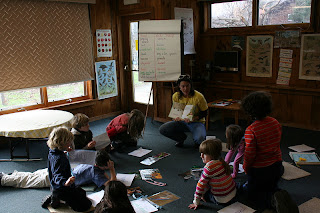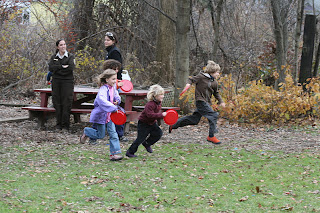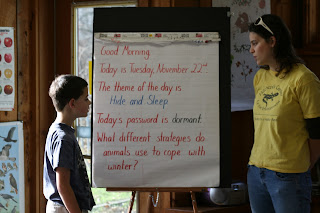What a perfect day to talk about strategies for coping with
winter. We had a wonderful time in homeschool today, studying the different
ways animals cope with the cold. We began by playing “Frost and Sun,” a tag
game in which children are tagged by the one person who is the frost and
“melted” by the sun person. Kids loved it!
We came inside and began morning circle by doing the
butterfly greeting. In this greeting children link thumbs and flap their
“wings” and say good morning. Then a few kids shared their lists of seeds that
are important in their lives. The seeds of cucumbers, tomatoes, pumpkins and
sunflowers are important to many of us in homeschool!
Then we read the schedule for the day and the morning
message. Today’s theme is “Hide and Sleep” and the password is dormant. We
discussed the difference between animals that are dormant in the winter (mostly
sleep but wake up occasionally to eat) and animals that are true hibernators
(animals whose body temperature drops and breathing and heart rate decrease,
and who do not wake up at all until spring). But those aren’t the only winter
strategies! To help us sort out all the choices animals have in winter, we
learned the six “-ate” words and talked about the animals that do each one.
These words are tricky but kids really made connections with them, recognizing
why each animals used these strategies. We soon realized that animals can do
more than one!



Then we had a special visitor, Laurel Carpenter, a wildlife biologist from the U.S. Fish and Wildlife Service. She showed us several pelts that New England mammals use for insulation during our cold winters: beaver, river otter, bobcat, and coyote. Kids got to pat the furs and feel the different kinds of fur: the rough fur on top and the soft fur underneath.
Then we did an investigation of one reason animals hibernate: she passed around a container of fresh pineapple for us all to smell. It smelled strongly! Then she passed around pieces of pineapple frozen in ice cubes. We almost couldn’t smell it! That’s how it is for animals in winter when they find food. It is much harder to find food when it is frozen because it doesn’t smell very much. We talked about the other reasons that animals might not hibernate. Some animals are plant, insect or seed eaters and these food sources die or become covered with snow in winter. Other animals don’t have thick fur coats to keep them warm. With cold temperatures and short amounts of daylight in which to forage, the best choice for some animals is hibernation.



Next we went outside and pretended we were woodchucks. Each child had to go make a den, which was symbolized by a paper plate. Then they had 15 seconds to collect as many milk caps as possible, which represented food, bringing them to their den. Kids did very well in the first round, but the second round was harder. There was much less food. Not everyone “survived”. In the third round, we introduced a coyote, who made it that much harder for woodchucks to collect food. That was the hardest of all!


After our game we had snack and went back out again for our outdoor adventure. We started with a scavenger hunt, looking for signs of animals getting ready for winter. Kids found black walnuts, a red squirrel, and a woodchuck hole. At the base of a tree was a great shelter for an animal under the roots. We made our way through the woods to the farm. After thoroughly searching the hibernaculum, we went to the cattails, which were poofy with seeds! We had a great time watching them fly around and sticking to people’s clothes.







When we came back we ate lunch and said good-bye to Laurel.
After we ate, kids colored animal bingo sheets. Then we played winter animal
bingo! I gave clues about what the animal did in winter and the kids had to
guess which animal I was talking about. It was a blast!



At journal time there was a lot to do! We glued in our bingo
cards, scavenger hunts and a chart saying which animals did what in the
wintertime. Then we played animal charades! Using our “-ate” words, kids acted
out some actions of animals in winter. Kids were wonderful actors! Then we had
closing circle and it was time to say goodbye. Thanks for a wonderful day
everyone!






































No comments:
Post a Comment